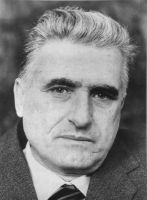
|
|
|
|
 |
Dubravko Tadić in memoriam
|
Dubravko Tadić, a leading figure of Croatian nuclear and particle physics, was born in Zagreb in 1934. He studied physics at the Faculty of Science and Mathematics of the Zagreb University, attending courses in theoretical physics of Ivan Supek, Vladimir Glaser, Borivoj Jaksić and Gaja Alaga. He graduated in 1958 and soon after became an assistant in the Department of Theoretical Physics at the "Ruđer Bošković" Institute in Zagreb. Under the supervision of Alaga, he completed his Ph.D. thesis on problems in nuclear beta decay and weak interactions, which he defended early in 1962. Soon afterwards, he was on a postdoctoral leave in the Department of Theoretical Physics of the University of Birmingham, then lead by Professor Peierls. In 1963, he was elected to the position Dozent at the Faculty of Science and Mathematics in Zagreb and changed his full-time employment to the Faculty where he worked until his premature death on 6 March 2003. In the meantime, he was elected to the positions Associate Professor in 1967 and Full Professor in 1972. At the Faculty, he had several duties of high responsibility, he was the Head of the Physics Department 1973 - 1975 and again 1992 - 1995 and the Head of the Theoretical Physics Division 1988 - 1992 and 1995 - 2003. In these positions, he was acting with enourmous energy and great care.
After 1963, Tadić continued also his engagement in the research work in "Ruđer Bosković" Institute until 1988 as a part-time collaborator. He was the Head of the Nuclear Physics Theory Group in 1965 and again in 1970.
During the first period of his research work, Tadić collaborated with G. Alaga, L. Sips, B. Eman and F. Krmpotić, and developed into a leader of a theory research group at the "Ruđer Bosković" Institute. He became a world-known expert on parity-violating nuclear reactions, and his mastery over the newly-developed techniques of the current algebra resulted, in collaboration with E. Fischbach, in the first major review of parity violating nuclear interactions. Subsequently, he applied these techniques in models of the weak Hamiltonian, the subject which remained in focus of his interest ever since. The reason was a breakthrough that came with attempts of electroweak unification in the early seventies. As an already established leader, he attracted a number of graduates, among them the M.Sc. and Ph.D. students he supervised during the seventies (A. Andrasi, H. Galić, B. Guberina, I. Picek, and J. Trampetić), as a core of the "Zagreb school" formed in the studies of the effective weak Hamiltonian with QCD corrections.
Later, main field of Tadić's interest became elementary particle physics, specifically electroweak interactions and quark models. He followed new developments (grand unification, composite models, chiral quark and chiral meson models, etc.) and included new collaborators. Apart from excursions to subjects such as questioning Lorentz invariance and equivalence principle, he returned in his later work to neutrino physics, particularly the neutrinoless double beta decay. It happened that in the early time of his carrier, he worked on Regge poles in high energy neutrino interactions, and later he focused on the processes that may reveal the ultimate nature of the neutrino.
In presenting the results of his research, he was always clear and precise with much care for details, but at the same time with deep insight. Apart from many general and popular writings and conference contributions, he authored or coauthored 128 publications in scientific journals whose impact on physics will be felt for many years to come. In his work in Zagreb, he introduced into research many young physicists who are now playing an important role in Croatian and international science. Dubravko Tadić is well known in international circles, having spent time in many research centres in the world.
The very successful research work of Tadić was recognized in 1974 when he received the "R. Bošković" prize of the Republic of Croatia, while in 1981 he became Associate Member of Yugoslav Academy and in 1991 Full Member of the Croatian Academy of Sciences and Arts.
Tadić was very much committed to the idea that one can do high quality science in a small country, insisting on keeping strong connections to international science, among other by insisting that his young collaborators go as postdocs to well known institutions abroad. He instigated or encouraged numerous conferences in nuclear and particle physics in Croatia, among others the well established series of Adriatic Meetings. He was aware of the importance of these international meetings for the students and young researchers and insisted on keeping their continuity also during the recent war years. He was exceptionally proud to act as a chairman of the 7th Adriatic Meeting in 1994 held on the Brijuni Islands, which was the first international physics meeting in the independent state of Croatia. On the list is also the 9th Adriatic Meeting which he was co-chairing, but during the preparation he passed away.
Dubravko Tadić was also a man of broad culture having read many books, with particular interest in the history of Central Europe and of his native country Croatia. His friends always appreciated moments of highly entertaining conversations, enriched with his sense of humour. Dubravko Tadić is an unforgettable figure in international and Croatian science. He is known by the seriousness in his work, by the depth of his knowledge as well as by his research contributions, and by his role in educating young scientists. He is very much missed by his family, his friends, colleagues, and by the whole physics community.
Editors
Copyright by The Croatian Physical Society
|